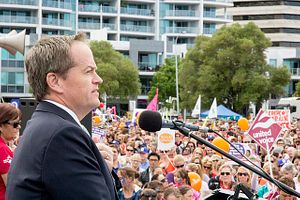It has taken less than a week since Donald Trump’s election victory in the United States for his influence to appear in Australian policymaking. The opposition leader, the Labor Party’s Bill Shorten, has launched what he is calling an “aggressive Australia First” approach to policy — an approach that he hopes will harness a nativist sentiment similar to what Trump exploited in the United States. His new strategy has begun with a focus on reducing the number of people on the skilled foreign workers visa, known as the 457 visa (the equivalent to the H-1B visa in the United States), a four-year visa that can be renewed an unlimited number of times with company sponsorship.
While the visa is designed to fill specific labor shortages in different regions of the country, it is also a vital tool in Australia’s ability to attract highly skilled immigrants. This remains essential due to Australia’s small population, which, despite its wealth, does not allow the country to produce enough specific or enhanced skills to compete against the larger countries of the OECD. This is particularly the case in regards to the essential modern information technology, digital, and software industries, which include companies that use the 457 visa extensively.
There are important concerns about exploitation of those on the 457 visa (and other visas). The government conducted an inquiry into the issue early this year, but these are issues of oversight and ethics, not issues of whether temporary foreign workers themselves are a negative component of Australia’s immigration policy.
Shorten’s political tactic relies on the continued economic fallacy that foreigners steal jobs. It’s a sentiment that maintains its strength because its basic logic “feels” true: there are a finite amount of jobs within a country and each new person is a competitor for those limited jobs. That immigration is a creative force, and has proven so in Australia, cannot seem to shake that persistent feeling.
Until now, bipartisan support for a strong immigration program has been demonstrated as a significant factor in Australia’s prosperity. Undermining this support for electoral gain is both a cynical exercise and could potentially prove damaging to the country’s future prosperity.
The political consequences of Shorten’s shift in rhetoric could be also significant, for both his party and the political landscape in general. Shorten’s new Australia First policy will undoubtedly create division within the Labor Party between its liberal and protectionist elements, providing a mirror to the similar divisions that exists with the Coalition government between their liberal and conservative elements. In a recent speech at a Sydney think tank, the shadow treasurer and Labor leader-in-waiting Chris Bowen strongly defended the ideas of an open economy and a generous immigration intake for Australia. Alongside this, Labor’s leader in the Senate, Penny Wong, last week gave a speech at the Canberra Press Club titled “Building Bridges Not Walls — The Case For An Open Australia,” arguing a similar case. Both of these speeches undermine the sentiment now being expressed by their party’s leader.
This is consistent with what is seen as a global reshaping of political divides away from Left-Right toward Open-Closed policy positions. Since the 1980s the Labor Party has reinvented itself into a liberal rational-pragmatist entity, abandoning much of its socialist ideological baggage. If it seeks to return to the protectionist ideas of its past it could alienate much of the educated urban middle class who moved to support the party due to the socially conservative nature of the Liberal Party.
The Labor Party currently lacks both the talent and the ideas to try and inspire the urban middle class, the new inner-city cultural elite, and its traditional working class constituency simultaneously. As a result, Shorten’s new policy objectives may continue the recent fracturing of political alliances in Australia, as the public seeks out new parties that can facilitate their concerns. It is indicative of the current political landscape that one of the Coalition’s most prominent ultra-conservative voices, George Christensen, also supports restrictions on the usage of the 457 visa.
The election of Donald Trump and the similar populist sentiments stirring in Europe should have been seen as an opportunity for Australia, a signal for the country to open its arms further and attract those skilled individuals turned off by their own domestic political environments. However, this is an idea that only Canada presently seems capable and willing to pursue, an idea deemed far too difficult for Australian politicians to adopt.
Instead for Australia it seems that Trump’s victory is seen as a tactic to ape — a signal to stoke grievances and retreat into parochialism, rather than attempt to understand, engage, and remedy concerns with evidence-based arguments. The 457 visa has become an obvious bone to throw to nativists now that asylum seekers are no longer seeking protection via maritime routes. But if skilled immigration policy snowballs in a similar fashion to asylum seeker policy then Australia may find itself on a self-defeating trajectory comparable the United States.

































